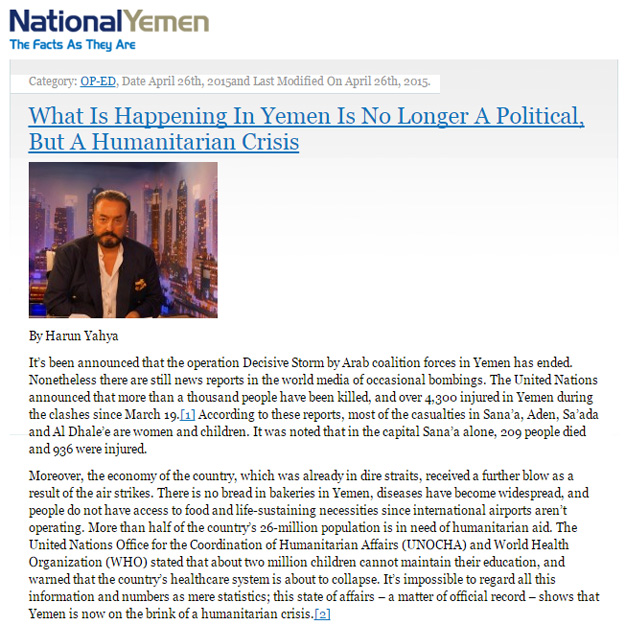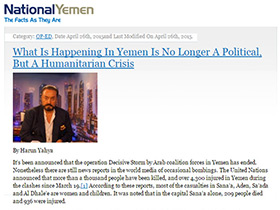
It’s been announced that the operation Decisive Storm by Arab coalition forces in Yemen has ended. Nonetheless there are still news reports in the world media of occasional bombings. The United Nations announced that more than a thousand people have been killed, and over 4,300 injured in Yemen during the clashes since March 19.[1] According to these reports, most of the casualties in Sana’a, Aden, Sa’ada and Al Dhale’e are women and children. It was noted that in the capital Sana’a alone, 209 people died and 936 were injured.
Moreover, the economy of the country, which was already in dire straits, received a further blow as a result of the air strikes. There is no bread in bakeries in Yemen, diseases have become widespread, and people do not have access to food and life-sustaining necessities since international airports aren’t operating. More than half of the country’s 26-million population is in need of humanitarian aid. The United Nations Office for the Coordination of Humanitarian Affairs (UNOCHA) and World Health Organization (WHO) stated that about two million children cannot maintain their education, and warned that the country’s healthcare system is about to collapse. It’s impossible to regard all this information and numbers as mere statistics; this state of affairs – a matter of official record – shows that Yemen is now on the brink of a humanitarian crisis.[2]
According to some sources, the real reason why the Saudi-led operation was ended is the worsening humanitarian crisis. Residents of Sana’a in particular were forced to leave their homes due to Houthi militants’ attacks on residential areas, coalition forces’ bombings and intense street clashes. Three weeks before the operation ended, thousands of Yemeni people fled the fighting and took shelter in refugee camps in Djibouti and Somalia. The United Nations High Commissioner for Refugees (UNHCR) stated that Yemen would need $274 million in urgent humanitarian aid over the next three months.[3]
The entire nation is on edge because of the lack of fuel and food aid, power cuts and lack of security. Human rights organizations draw attention to the fact that in some regions, poor families in particular do not have access to food and medical supplies. The people of the country, which was already suffering serious problems in security and healthcare and where basic services cannot be supplied, is hoping and waiting for stability to come. Oxfam, a relief organization, said, “Over 60 percent of the population – 16 million people – were already in need of some form of aid before the air strikes started. Conflict in Yemen is making a dire situation worse…” Heavy air strikes across the country result in food and fuel shortages.[4]
What has taken place in Yemen in the last month in fact reveals a concrete reality: For the sake of some political ends, Western countries have no qualms about organizing military operations in lands which they classify as “third world,” or providing logistic or intelligence support or weapons to such interventions. These countries send their intelligence staff and set up military bases in the region supposedly to fight terrorism and stabilize the region, and ignore the deaths of innocent civilians, women and children. As in the case of Yemen, international organizations are content to announce statistics related to material and human casualties, and busy themselves with preparing after-action reports.
What needs to be done to end this conflict that affects each and every individual in Yemen, to overcome the humanitarian crisis, to establish security and stability and to bring both material and spiritual welfare to the country is to end the sectarian disintegration of society. So long as Muslims keep blaming and shedding the blood of each other simply because they are Shia or Sunni, these troubles will not come to an end. The fact is that during the time of the Prophet (pbuh) there were no factions whatsoever among Muslims based on nation or ethnicity. The real reason for the sufferings today is that the Islamic countries have departed from this sincerity, and have forgotten this loving and affectionate manner.
There are numerous ethnic groups in the Middle East such as Arabs, Turkmens, Azeris, Persians, Kurds and Turks, yet what they all share in common is that they are all Muslims. Since this fundamental and vital value that forms unity and bonds of love and brotherhood is being put aside, there has been neither stability nor peace in the Middle East since the collapse of the Ottoman Empire. All Muslims need to unite at once in order to put an end to the backwardness, instability, violence and terror prevalent not only in Yemen but throughout the Islamic world in general. All these pains can be eased when countries practice policies that serve not only their own interests but provide material and spiritual comfort, peace and security to all peoples in the region.
For Yemen to be more powerful, to heal its wounds, to end disputes and to attain a level of cultural, moral and social development that will be a model for the entire Islamic world, Muslims there must sincerely and lovingly embrace each other at once and never forget that they are brothers. That’s why Shia and Sunni groups in the country must immediately – and urgently – take the necessary steps towards unity.
Adnan Oktar's piece on National Yemen:


